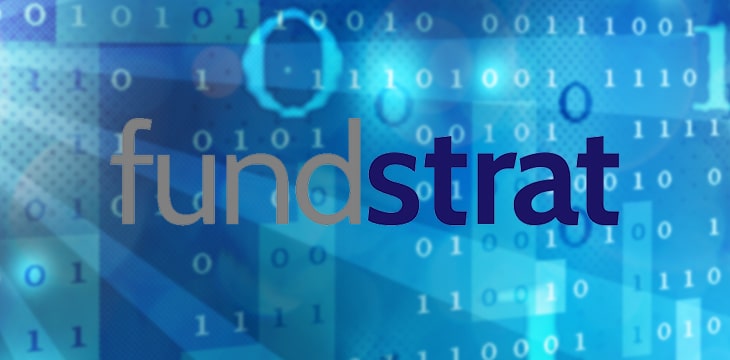Source – https://coingeek.com/
Fundstrat Digital Asset Consulting has produced another report updating its clients on BSV ecosystem progress. The report, released exclusively to investors last week, refers to BSV as “a Web 3.0 platform,” describes the concept of “Blockchain as a Service (BaaS)”, big data application potential, and gives some examples of the companies building on the network in different ways.
Similar to previous reports, Fundstrat (headed by well-known Wall Street strategist Thomas Lee) describes BSV’s “unique technological approach” as its most compelling aspect. Its large-scale data processing capabilities, combined with the security and verifiability of blockchain records, mean that developers are building real applications with real use cases. Industries seriously looking at the BSV network include supply chains, healthcare, payments, real estate, e-government services and more.
The emergence of BaaS infrastructure solutions will make enterprise adoption easier, the report says. Some of the projects it profiles are aimed at building solutions for others to come onboard without first spending years studying Bitcoin and blockchain history and the technical challenges of integrating their systems.
Fundstrat has published previous reports on BSV to its list of investor clients, in November 2019 and February and July 2020. Those reports also focused on BSV’s big data focus and “unique vision” compared to other blockchain networks, and highlighted the growing number of businesses building its infrastructure.
It says:
“The BSV and BTC networks are going after very different use cases. BSV is positioning itself as a Web 3.0 platform upon which Dapps and enterprise data applications are built that can store data directly on the main block chain layer (efficiently, for low fees) due to its unbounded block size cap. This approach has tradeoffs but is unique relative to other blockchains as it allows for certain types of big data applications that may not be well suited for other networks.”
The report includes a PowerPoint presentation that gives a general overview of the BSV network and its architecture. It details the functions of services like mAPI and MinerID for obtaining transaction fee information, and the relationships between miners (transaction processors), pools and ordinary users. It describes the structure of the BSV Metanet and provides statistics on BSV unit price, volumes, transaction counts, exchanges and average per-transaction fees (notably, these are US$0.0013 on BSV, $8.22 on Ethereum and $10.16 on BTC).
In targeting the “big data” enterprise market, BSV should serve the “Three Vs of Big Data” which are volume, velocity and variety. The report lists the benefits of users’ ability to own their own data and keep it both private and secure, noting the massive costs to organizations in the event of a data breach.
Companies named in the report include UNISOT, Veridat, nChain, TAAL, Fabriik, Planaria, MetaStreme, Mattercloud, FYX, BitBoss, Haste, Transmira, Twetch and Relica, EHR Data, and wallets HandCash, RelayX, DotWallet and Money Button. These companies cover a wide variety of big data use scenarios, showing BSV’s versatility and potential business models.
Fundstrat does warn that becoming involved with BSV carries risk due to the criticism it often receives from other sectors of the blockchain industry, saying “We recognize that there is a subset of the crypto community that does not have a favorable view of certain BSV supporters and the BSV coin or anyone who associates with it as an extension.”
We should note that much of that criticism comes from coordinated attacks on BSV from those who stand to lose the most commercially should BSV’s superior technology continue to prove itself over existing platforms. ETH routinely fails to scale to perform contract functions at both technical and economic levels, while BTC’s deliberately crippled capacity make its transaction fees prohibitively high to use as a payments network.
However, the report does mention that the blockchain industry is maturing and “maximalism fading.” While BSV would need to prove it can overcome this polarization and move past its “early reputational criticisms” in order to succeed, BSV’s focus on enterprise tier data applications and the BaaS infrastructure could convince more outsiders to take the plunge. Building a healthy user community was critical to achieving success, it concluded.
